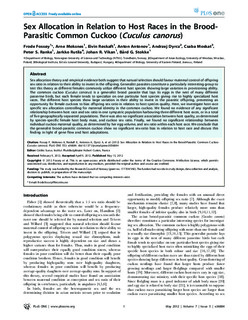Sex Allocation in Relation to Host Races in the Brood-Parasitic Common Cuckoo (Cuculus canorus)
Fossøy, Frode; Moksnes, Arne; Røskaft, Eivin; Antonov, Anton Tinchov; Dyrcz, Andrzej; Moskát, Csaba; Ranke, Peter Sjolte; Rutila, Jarkko; Vikan, Johan Reinert; Stokke, Bård Gunnar
Journal article, Peer reviewed
Permanent lenke
http://hdl.handle.net/11250/2365468Utgivelsesdato
2012Metadata
Vis full innførselSamlinger
- Institutt for biologi [2575]
- Publikasjoner fra CRIStin - NTNU [38127]
Sammendrag
Sex allocation theory and empirical evidence both suggest that natural selection should favour maternal control of offspring sex ratio in relation to their ability to invest in the offspring. Generalist parasites constitute a particularly interesting group to test this theory as different females commonly utilize different host species showing large variation in provisioning ability. The common cuckoo (Cuculus canorus) is a generalist brood parasite that lays its eggs in the nest of many different passerine birds, but each female tends to specialize on one particular host species giving rise to highly specialized host races. The different host species show large variation in their ability to invest in the parasitic offspring, presenting an opportunity for female cuckoos to bias offspring sex ratio in relation to host species quality. Here, we investigate host-race specific sex allocation controlling for maternal identity in the common cuckoo. We found no evidence of any significant relationship between host race and sex ratio in one sympatric population harbouring three different host races, or in a total of five geographically separated populations. There was also no significant association between host quality, as determined by species-specific female host body mass, and cuckoo sex ratio. Finally, we found no significant relationship between individual cuckoo maternal quality, as determined by her egg volume, and sex ratio within each host race. We conclude that the generalist brood-parasitic common cuckoo show no significant sex-ratio bias in relation to host race and discuss this finding in light of gene flow and host adaptations.
